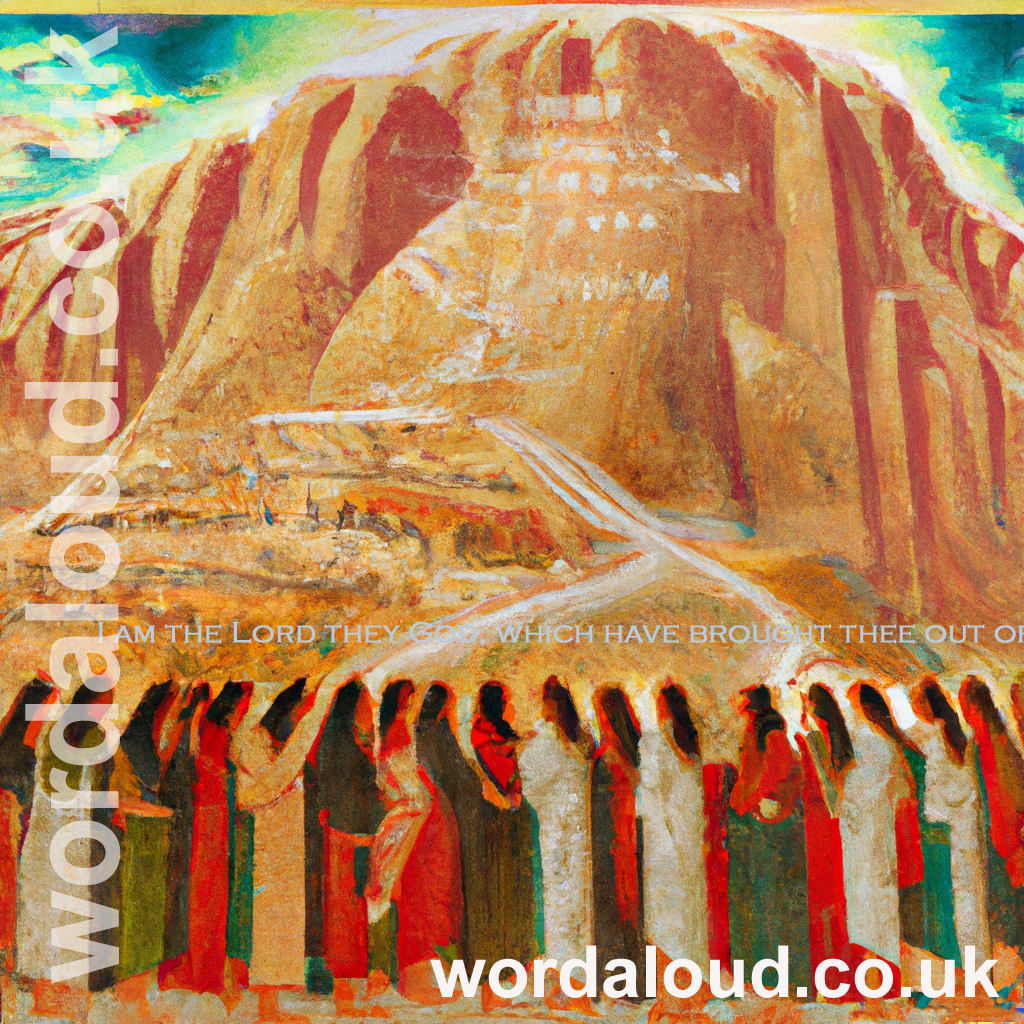Christian Art | Easter To Pentecost | God So Loved The World
John 3: 16-21 Audio Bible KJV | King James Version | Daily Verses
16 ¶ For God so loved the world, that he gave his only begotten Son, that whosoever believeth in him should not perish, but have everlasting life.
17 For God sent not his Son into the world to condemn the world; but that the world through him might be saved.
18 ¶ He that believeth on him is not condemned: but he that believeth not is condemned already, because he hath not believed in the name of the only begotten Son of God.
19 And this is the condemnation, that light is come into the world, and men loved darkness rather than light, because their deeds were evil.
20 For every one that doeth evil hateth the light, neither cometh to the light, lest his deeds should be reproved.
21 But he that doeth truth cometh to the light, that his deeds may be made manifest, that they are wrought in God.
Our relationship with God is a call to love. Our Father loves us unsparingly. He gave to us and for us His only begotten Son. Christ gave himself to free us from sin and death, to reconcile us with God. All we are asked to do is to believe in Jesus and to respond to God’s immeasurable love with a reciprocal love, through faith in Christ.
It is through love and faith that we discover our dignity. We are called to enter into the body of Christ, to love God with all our strength, as with all our soul, and so to discover life. This is a spiritual process. We are to understand love as being through the life of the spirit. This love is not to do with fleshly attachments. Indeed, we are to put to death that which is old, of the flesh, so that we may fully enter the life eternal of the spirit, and this through Jesus.
It may seem an impossible task. So it would be without grace to assist us. Our poor efforts alone could not do it, just as Nicodemus, with all his knowledge of the letter of the Old Law, has realised the limits of the Old Law and come to speak with Jesus to discover the New.
We are called to faith, to belief in Jesus. This is the light of the world. It is through Christ that we are enabled to live in the spirit and have everlasting life. We are to give ourselves to Jesus, so that he may take charge of our thoughts and words and actions. Through faith in Christ, our freedom from sin and death, our salvation, becomes no longer an impossible task. God will work through us.
We are asked by Jesus not to be afraid. When we do evil, when we sin, when we fall short of being what we should be, we may flinch from the light of Christ. Our sins cloud our spiritual sense. We may wish to hide from the light, because it is in the light that our sins are exposed. Jesus always calls us to return to him. His arms are always open to us, to receive, as it were, us prodigal sons.
Our faith in Christ is synonymous with our love of Christ. This great love is intended to be always reciprocal. Through faith, through love, we experience God’s forgiveness. Then we know that there is no need to cling to the darkness, in order to try to hide our sins. That will only make things worse. It is in the light that we may be honest, as we are when we acknowledge our sins, and discover once more the joy of our life in Christ.
It is as we ask Christ to know us fully, through and through, in the light, that we are enabled to know ourselves, and to love ourselves, and to live in dignity.
‘He it is who makes a single flock of holy sheep from every race under the heavens without exception… This is why we celebrate the Lord’s Pasch with the unleavened bread of sincerity and truth. The leaven of our old malice is thrown away, and a new creature drinks deep and feeds upon the Lord himself. For our participation in the body and blood of Christ has this effect: it makes us become what we receive; it enables us, with our whole being, in our spirit and our flesh, to bear him in whom and with whom we have died and risen again.’ Pope St Leo the Great
Audio Bible KJV | King James Audio Bible | Endnotes
Deus Caritas Est | God Is Love
Deus Caritas Est is a papal encyclical written by Pope Benedict XVI in 2005, in which he explores the theme of love in the Christian tradition. The title of the encyclical, Deus Caritas Est, translates to ‘God is Love’ and reflects the central message of the document: that the love of God is the foundation of Christian faith and life.
Pope Benedict draws upon a wide range of theological and philosophical sources to present a comprehensive account of love. He emphasizes that love is not just an emotion or feeling, but a choice and an action. He writes: ‘Love is, in the end, the only response which is fitting for God’s gratuitous love for us.’ (Deus Caritas Est, 1) Love is thus the very essence of Christian faith and practice.
One of the key themes in Deus Caritas Est is the relationship between love and social justice. Pope Benedict argues that love is not just a private matter between individuals, but has important implications for how we live together in society. He writes: ‘Love of neighbour, grounded in the love of God, is first and foremost a responsibility for each individual member of the faithful, but it is also a responsibility for the entire ecclesial community at every level.’ (Deus Caritas Est, 20) In other words, love requires us to be concerned for the welfare of others and to work for justice and peace in the world.
Pope Benedict also emphasizes the idea that love is not just a human virtue, but is rooted in God’s own nature. He writes: ‘God’s love for us is fundamental for our lives, and it raises important questions about who God is and who we are.’ (Deus Caritas Est, 1) He argues that God’s love is not just an abstract concept, but is a tangible reality that is demonstrated in the person of Jesus Christ. The love of God is thus the source of our own capacity to love.
Throughout Deus Caritas Est, Pope Benedict draws upon the teachings of the New Testament to support his arguments. He cites the well-known passage from 1 John 4:8, ‘God is love,’ and explores the implications of this statement for Christian faith and practice. He also discusses the centrality of the love commandment in the teachings of Jesus, particularly in the parable of the Good Samaritan (Luke 10:25-37).
Deus Caritas Est also explores the relationship between eros and agape, two different forms of love. Eros is often understood as romantic or sexual love, while agape is a selfless and unconditional love that seeks the good of the other. Pope Benedict argues that these two forms of love are not in opposition to each other but rather complement each other. He writes: ‘The more the two, in their different aspects, find a proper unity in the one reality of love, the more the true nature of love in general is realized.’ (Deus Caritas Est, 6)
Furthermore, Deus Caritas Est recognizes that the practice of love is not always easy, and that it requires a continual effort of conversion and transformation. Pope Benedict acknowledges that human love is often imperfect and subject to selfishness and sin, but argues that the love of God is a source of grace that can transform and heal our brokenness. He writes: ‘Through this close relationship with God, we learn to see others in their dignity, created in God’s image, and this demands a responsibility for others and for the world in which we live.’ (Deus Caritas Est, 18)
The encyclical also explores the relationship between love and the sacraments, particularly the Eucharist. Pope Benedict argues that the Eucharist, which is a sacrament of love, is a source of nourishment and strength for Christians in their journey of love. He writes: ‘The Eucharist draws us into Jesus’ act of self-oblation.’ (Deus Caritas Est, 13)
Finally, Deus Caritas Est emphasizes the importance of love in the Church’s mission to the world. Pope Benedict argues that the Church’s primary task is to witness to the love of God through its words and actions. He writes: ‘The Church cannot and must not take upon herself the political battle to bring about the most just society possible. She cannot and must not replace the State. Yet at the same time, she cannot and must not remain on the sidelines in the fight for justice.’ (Deus Caritas Est, 28)
In summary, Pope Benedict XVI’s Deus Caritas Est provides a comprehensive account of love that is grounded in the Christian tradition. The encyclical emphasizes the importance of love as a choice and an action, as well as its relationship to social justice and the nature of God. It recognizes the complexities and challenges of the practice of love, but also highlights the transformative power of God’s love in our lives.








